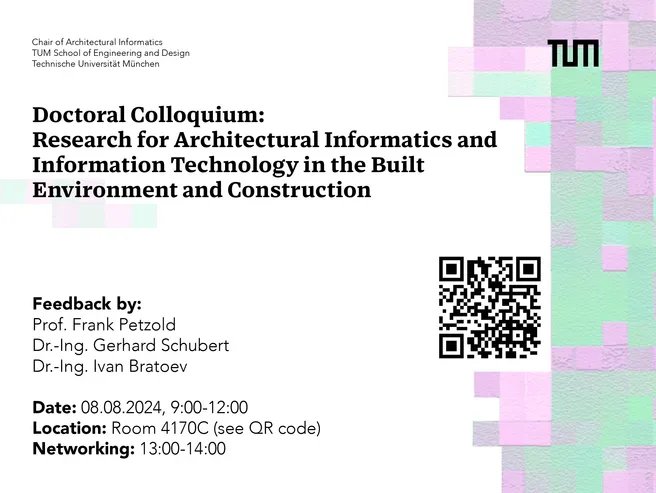On August 8, 2024, the Chair of Architectural Informatics of the Technical University of Munich hosted its first Open Stage Doctoral Colloquium.
Doctoral students were invited to present their research and receive feedback from our esteemed panel. This year’s event was dedicated to Architectural Informatics and Information Technology in the Built Environment and Construction. The colloquium provided a unique opportunity for doctoral candidates to present their ongoing research and receive feedback from a panel of experts. The event attracted participants from allover TUM, the University of Stuttgart, and other institutions, fostering a collaborative environment that encouraged knowledge exchange and innovation.
The panel, which included Prof. Frank Petzold, Dr.-Ing. Gerhard Schubert, and Dr.-Ing. Ivan Bratoev, provided detailed feedback on each presentation. The experts praised the diversity of topics and the innovative approaches presented, offering constructive insights to help refine the research projects.
The colloquium featured a range of topics, from artificial intelligence (AI) applications to user engagement in architectural design. The open stage format allowed each participant to share their ideas in a relaxed, yet stimulating atmosphere.
The topics presented at the colloquium covered a wide range of innovative approaches in architectural informatics and urban planning. Key themes included the use of artificial intelligence (AI) for creating multi-scale digital twins to enhance urban planning, strategies for improving user interaction with architectural spaces through tangible user interfaces (TUI) and AI, and the role of gamification in fostering citizen engagement in urban development. Additionally, the impact of virtual reality (VR) tools on decision-making processes in construction planning was explored, along with the potential of digital twins for better modeling and managing future urban environments.
The colloquium concluded with a networking session, giving participants an opportunity to discuss their projects further and explore potential collaborations. The event received overwhelmingly positive feedback, with both presenters and attendees expressing enthusiasm for future editions.
The positive reception ensures that this event will continue to grow, promoting further advancements in the integration of AI, digital twins, and user-centered design in the built environment. We hope to advance this further and encourage students from other disciplines to join for gaining a different perspective on their research.
